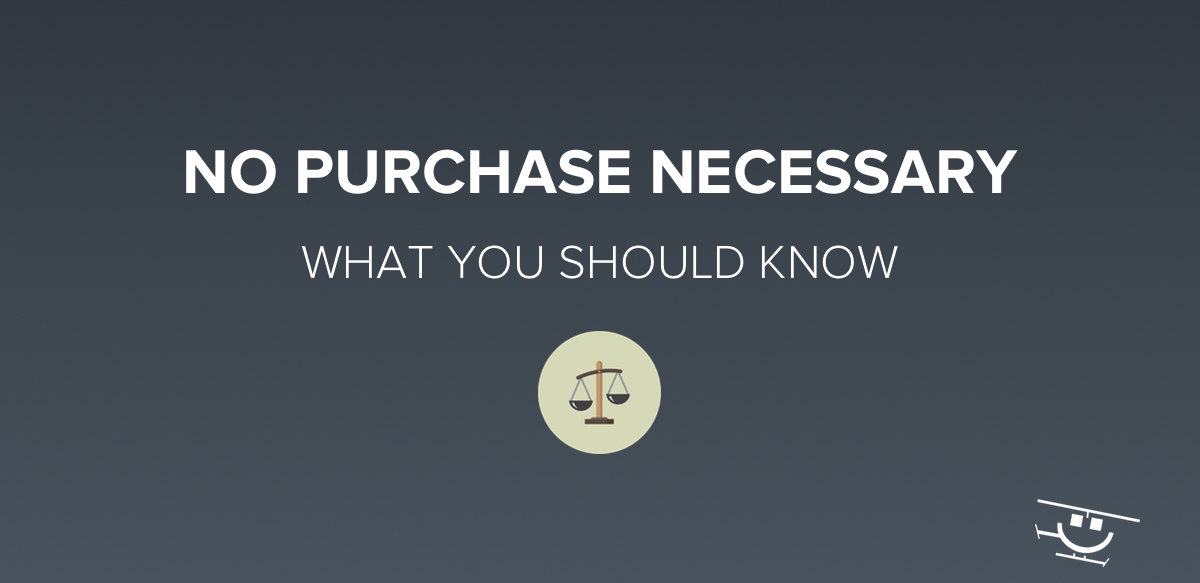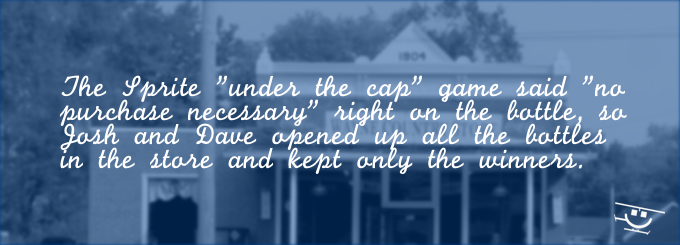
We get this all the time. Someone emails us a message asking:
“Hi Rafflecopter! I’m writing on behalf of The Incredible Widget Company. I’d like to run a giveaway through your app, but we want to require entrants to make a purchase on our site. Can we ask people to provide a receipt of purchase for a product a specific giveaway is promoting as an option for them to gain entry?”
If you’re familiar with sweepstakes and gambling regulations in the US, you know the answer is “no way!”. You’ve probably read the verbiage ‘NO PURCHASE NECESSARY’ before, which means entrants cannot be required to make a purchase or plunk down money in some form or fashion to enter to win a contest or sweepstakes.
Below, we’ll discuss the definition and meaning behind this language, help describe what’s allowed, and when you might be crossing the line. Before continuing, be aware that while many countries have laws surrounding gambling, lotteries, and sweepstakes, we’ll be focusing on the US for the sake of this article.
Additionally, we’ve seen many giveaways run through our platform and while we feel confident in talking about the subject and promise to offer the best knowledge we possibly can, we’re not lawyers. Just a disclaimer ;)
Sweepstakes, Contests, Lotteries, & Raffles

First, let’s discuss the differences between a sweepstakes promotion, contest, and a lottery. To understand the differences, it’s important to become familiar with the word “consideration”.
When you hear the word consideration, it’s referring to the entrant’s time, effort, or money. It can come in several forms, such as sending a text message, a 900 number phone charge, subscription fees, making a purchase, or engaging in activities that require a considerable amount of time (like filling out an in-depth survey for example or making multiple in-store visits).
Sweepstakes. Typically when we refer to a giveaway on our blog, we’re referring to what is technically known as a sweepstakes promotion. Rafflecopter specifically helps administer sweepstakes promotions, which is defined as ‘a promotional drawing in which prizes are given away at no charge to the participants’. Winners will be selected at random — it’s the luck of the draw if you’re chosen.
To keep a sweepstakes from becoming an illegal lottery, there must be no consideration.
Contests. A contest is similar to a sweepstakes, except to win there’s an element of skill involved. A contest is defined as ‘an event in which people try to win by doing something better than others’. Winners will be chosen or judged based on their submission or performance. Like a photo or essay contest where the best photo taken or essay written wins.
A contest awards prizes, but replaces the element of luck / chance like you’d see in a sweepstakes with selection of the winner on the basis of skill or intellect.
Lotteries. A lottery is defined as ‘a means of raising money by selling tickets and giving prizes to the holders of numbers drawn at random’. Lotteries in this country are exclusively government run, and prohibited outright in a large handful of states. A lottery is a game of luck that requires an entry fee.
A lottery has three key determinative elements: prize, chance, and consideration. Additionally, you might have a lottery that has no winners, and thus the prize is turned over (perhaps you’ve seen Powerball display “There were no jackpot winners for Saturday’s drawing… The next drawing will be Wednesday, April 29th, 2015”).
Raffles. A raffle is very similar to a lottery, where a number of persons buy chances to win a prize (think of a church raffle or charities raising money for a cause). Unlike lotteries however, a raffle will always have a winner chosen.
Every state’s laws pertaining to raffles are a little different, but the one rule that’s consistent for all raffles is that they’re specifically meant for non-profit organizations. The organizations that host these events often find that they are a great way to raise funds and to promote awareness for their causes. If your company or organization doesn’t have non-profit status, you’ll be hard pressed to get a raffle approved by your state.
*Psst* Here’s an example of a raffle being run by the Boys & Girls Clubs of Metro Denver, Inc., a Colorado nonprofit corporation. If you read their FAQs you’ll see they’ve registered with the State of Colorado.
As an entrant, you cannot participate in a raffle or a lottery without purchasing some kind of ticket, a form of consideration. Sweepstakes and contests are the exact opposite however, and asking entrants to purchase a product or spend money to increase your chances of winning is illegal. This is why if you read the terms and conditions of the giveaway you’re entering, you’ll see the phrase ‘NO PURCHASE NECESSARY’ so often (it’s the very first disclaimer you’ll read in our terms and conditions boilerplate).
No Purchase Necessary Meaning & The Law

If your company is running a contest or sweepstakes, you can’t ask entrants to purchase something as a means of entry. And if your company isn’t a non-profit, you cannot run a raffle. And unless if you’re the government, it’s illegal to run a lottery.
There are a few government entities that help make sure these promotions don’t break the law: the FTC, the FCC, the USPS, and your state’s regulations.
The FTC’s Involvement
The Federal Trade Commission is an independent agency of the government who helps protect the consumer. In the FTC’s small business advertising FAQs, they specify that “sweepstakes-type promotions that require a purchase by participants are illegal in the United States.” The FTC doesn’t directly oversee sweepstakes, but might step in if they see a sweepstakes scam taking place.
*Psst* Become more familiar with the FTC’s involvement with giveaways pertaining to the CAN-SPAM Act.
The FCC’s Involvement
The Federal Communications Commission is an agency similar to the FTC, except the FCC helps regulate communications over radio, TV, internet, cable, etc. If you’re planning to promote a sweepstakes or contest over any of these communication channels, it’s important to disclose the material terms and conditions of the promotion (eligibility requirements, prizes that can be won, and start and end times for example) and not advertise the sweepstakes in a deceptive way. Like the FTC, the FCC doesn’t directly oversee sweepstakes, but will step in if they see a promotion violating these rules.
To fall in compliance with the FCC, it’s best to communicate the ‘NO PURCHASE NECESSARY’ clause when advertising your giveaway, no matter if that’s on your website or a radio ad.
The USPS’ Involvement
Even the United States Postal Service is getting involved. In 1999, the Deceptive Mail Prevention and Enforcement Act (DMPEA) was passed, giving the USPS authority to stop mail and impose penalties to those sending out sweepstakes mailings that are deceptive.
Sweepstakes mailings have to disclose that a purchase isn’t necessary to enter and won’t improve the chances of winning. These disclosures must appear in the mailing, in the rules and on the entry form. They must be very easy to find, read and understand.
Your State’s Involvement
And as noted above, laws surrounding gaming, gambling, sweepstakes, contests and raffles all vary state by state. To find out what the laws are in your state, google “sweepstakes laws + your state”. After a bit of searching, here’s an example doc that goes into detail for our home state of Colorado.
What if I’ve Broken the Law?

“I’ve been running giveaways asking entrants to purchase an item for my shop for the last six months and I’m just finding out this is illegal — what should I do?”
First, we’d recommend you stop. Second, unless you’re a big company whose promotions reach a huge audience, so long as you’re mindful of the rules moving forward, you should be fine.
The companies that we’ve seen get in trouble over these laws are large corporations that should have a) had their legal team look over their promotion’s terms before launching them, and b) listened to their consumers before they started filing complaints. It takes a really shady operation and a lot of complaints to stir the pot to get the FTC or FCC involved (though it does happen)
Consumers are also getting smarter surrounding these laws as well. More consumers know that if someone asks you to pay to enter, there’s a good chance it’s a scam. Therefore, if you ask entrants to pay to enter, even if it’s indirectly, you start to appear like a scam. Might be best to avoid that!
No Purchase Necessary: Q&A
Again, while we’re not lawyers, below are a handful of frequently asked questions we’ve received over the past several years regarding rules that surround the ‘no purchase necessary’ wording.
Question: Can the winners of a sweepstakes be asked to pay for shipping?
Answer: Nope. When you run a sweepstakes or giveaway, it’s your responsibility as the giveaway sponsor to ship out the prize. If you ask entrants to pay for shipping, not only is it against the law, it would be very off-putting to the winner.
Question: Can entrants be asked to provide a picture or proof of a receipt?
Answer: This question is asked surprisingly often, but again the answer is no. If you’re asking for a proof of purchase statement like a receipt, that’s directly in violation of ‘no purchase necessary’ since you’re asking someone to see a proof of purchase.
Question: How does McDonalds get away with game pieces on soft drink cups? You need to purchase a drink to get those.
Answer: You might be referring to the ever-so-famous McDonald’s Monopoly sweepstakes promotion, where you collect game pieces on food items during certain times of the year. If you read their terms and conditions carefully, McDonalds offers an alternative method of entry, and can be requested by mailing a handwritten, self-addressed stamped envelope to an address to collect game pieces.
Question: Can I hold a raffle for my business where entrants purchase a ticket for $5?
Answer: If you operate as a non-profit, you might be able to. I say might because each state has different laws concerning raffles. You’re best to contact your state’s Department of Revenue to find out the barriers to entry. If you’re a for-profit company, chances are you’re out of luck!
Question: What if the entry option to purchase something is an optional entry option?
Answer: Sorry! If entrants are still paying you or plunking down money to increase their odds of winning, it’s a no-go. It doesn’t matter if the entry’s optional, it’s still consideration and is in violation of everything we discussed above.
Question: Can I ask entrants to post a review on Amazon for my company’s product or book as an entry into my giveaway?
Answer: Tough call, though we’re going to be better safe than sorry and say no. If you have a promotion set up to where entrants participate by leaving a review for a product, that implies that in order to leave a review they must purchase the product. Additionally, Amazon has guidelines in place for customer reviews. For more info, check out ‘Customer Reviews Guidelines Frequently Asked Questions from Authors’ and Amazon’s ‘General Review Creation Guidelines’.
We want to reiterate that we’re not lawyers. But after seeing hundreds of thousands of giveaways run through our platform, we feel we’re in a place to share advice with you on this subject that’s not often discussed to help keep your promotions legal.
If you have any additional questions that weren’t addressed in the Q&A above, leave a comment below and we’ll do our best to help figure out your best plan of attack!
Pingback: The Illegal Raffle | The Pen Habit()
Pingback: Reddit Front Page Traffic & SEO Impact | Rafflecopter()
Pingback: Rafflecopter Case Study: How To Promote A Giveaway (Step by Step)()
Pingback: The Top 10 Most Popular Rafflecopter Blog Posts of 2015()
Pingback: Common Mistakes Companies Make When Running an Online Sweepstakes()
Pingback: Sweepstakes Terms and Conditions Template | Rafflecopter()
Pingback: 7 Simple Changes You Can Make to Boost Blog Traffic & Build a Loyal Audience | Blogging, Small Business, Web Design & Hosting Tips - A Small Orange()
Pingback: Astrophotography Blog()